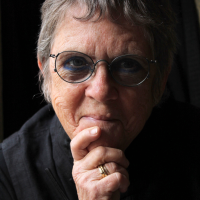Check out Elephant’s Continually-updating Coronavirus Diary. ~ Waylon
~
As many humans around the country and the world are facing this fast-moving pandemic, with epic losses and suffering, many find themselves united by universal and painful emotions like fear, aversion, and hopelessness.
These emotions can be miserable and debilitating for all of us at certain times. Yet my beloved dog, Peaches, reminds me (once again) of the wisdom that’s inside of all of us.
Here are three bits of advice my dog has shared, stopping me from going down the rabbit hole during the COVID crisis:
1. Peaches on fear
Fear is dark and slimy. It is all-encompassing, like a heavy blanket thrown over our bodies, keeping us from breathing, thinking clearly, and moving forward.
Before sheltering in place, as I was walking the streets of San Francisco, I noticed I was afraid that everyone I passed was disease-ridden and infectious. I became contracted and felt a sense of dis-ease, as my nervous system tap-danced all over the place.
Strangely enough, when I looked into my beloved dog Peaches’ face, I didn’t see this fear, but rather a hint of concern in her beady dark eyes that said:
“When you’re afraid, you’ve got to remember to come back to the present moment with me and all the good stuff that’s there. You’re a good meditator, I know you are—you know that living in the present time means you’re going to be less afraid, because fear is only about the future!”
That voice of hers reminded me to see fear for what it is—a future-oriented emotion—and when I did that, I was able to lift the anxiety blanket hanging over me.
I then made a choice to move to the countryside to live with family in what I’d call a safety zone.
It is often possible to make choices for love, laughter, and ease. Thanks, Peaches!
2. Peaches on aversion
Aversion is a nervous static that arises in the mind when we feel that conditions controlling our lives are out of our control and we’re being unjustly treated.
Anger and outrage (and, of course, suffering) arise because our moral “views” tell us our situation is unjust and wrong as our government—theoretically present to care for its people—chooses not to do the good fight.
Even riding my exercise bike at a higher speed while watching the evening news did little to mitigate the anger and ill will.
Then I look to Peaches and how she’s doing with our extreme condition, and I hear her remind me to:
“Let go of the aversion you have for the humans around you, and instead tap into gratitude and care for those who are doing their very best to lead humane and generous lives. Have some faith in humankind!”
Peaches is a trusting four-legged being who clearly appreciates most of the humans around her. All you have to do is watch her at the dog park when she encounters new people: a brisk prancing forward, tail wagging, and goodwill alive and well.
She sees her world as one of possibility.
I decided to look to the many people on the “front lines” who are working their hearts out delivering food, filling prescriptions, driving buses, tending the sick in hospitals and emergency clinics, restaurant staff offering food to go, and so on.
- They are working relentlessly (sometimes invisibly) to offer what help they can, and they deserve our gratitude and goodwill.
- They are putting themselves at risk because they must work and because they feel committed to service.
- They make our lives easier by far.
I found myself smiling at those I saw on the street, warmly thanking the lady at the pharmacy, or the young Chinese convenience store owner, and I did this because I didn’t want any of us to become invisible to one another. We must witness each other’s humanity.
If we follow Peaches’ lead and do this, we discover that the jagged edges of aversion fade just a bit, and the world looks softer and safer.
3. Peaches on hopelessness
Hopelessness is a murky landscape where we have difficulty summoning optimism and positive energy.
We become lost in numbness as we move forward, wandering through the maze without reaching the end.
I believe this condition logically follows aversion and fear, as it isolates and depresses us. But if we’re “good Buddhists” and understand both life’s uncertainty and our lack of control, it seems that hopelessness has less clout.
Peaches reminds me,
“The good news is that we (often) do have control over a few things, like what we do, think, and feel.”
Peaches and I are in agreement about this uncertainty and lack of “control” thing, and as she moves comfortably through our chaotic world not letting the discursive mind interfere with her positive attitude, I am reassured, inspired. (And the more I observe Peaches, the more comfortable I feel about all the uncertainty.)
This lucky dog doesn’t dwell on politics, war, economic injustice, discrimination, and personal heartbreaks.
Instead, she anticipates warm bodies to sit next to, faces to lick, good food to eat, and people to leap up into the air for—the basic essentials of life in the dog kingdom.
She is an agent of love and affection and understands how good that makes others feel; she knows that love generates possibilities.
Peaches and I hold passionate wishes for you who read this that you may realize some (if not all) of these pieces of Buddhist and canine wisdom.
And she wants me to ask you,
“How can you be more like a dog today?”
Sending blessings and wishes for everyone’s safety, love, and well-being.


 Share on bsky
Share on bsky





Read 8 comments and reply